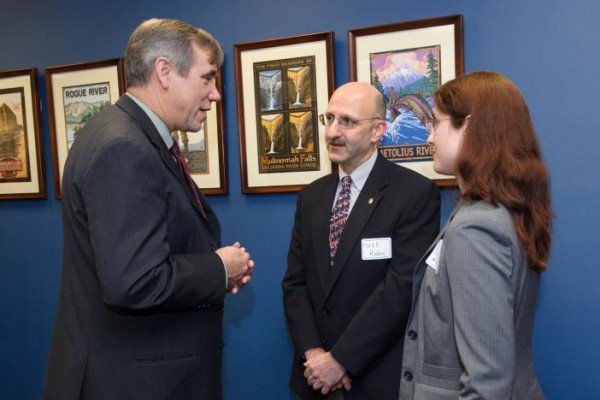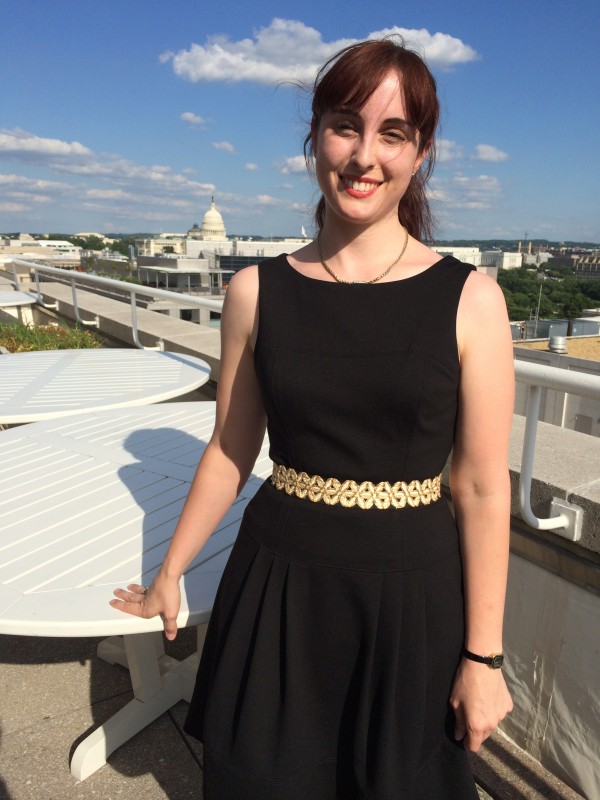2 November 2015
Showing by (simply) telling
Posted by mcadams

Jessica Ball (right), a Mendenhall Postdoctoral Fellow at the USGS, spent a year translating science into simplified language on Capitol Hill. Here, Ball and Tualatin Valley Fire & Rescue Emergency Manager Jeff Rubin (center) attend a Constituent Coffee event at the office of Oregon Sen. Jeff Merkley (left). Photo courtesy of Jessica Ball.
By Jessica Ball
Why did I decide to submit an abstract for the “Up-Goer Five Giving-It-a-Try” session at the 2015 AGU Fall Meeting, which challenges scientists to explain their work using only the 1,000 most common words in the English language? Well, I’m already presenting my research for the meeting, so I’ve got the talk outline and figures already queued up. That made my decision easier.
But, what I really wanted was to see whether I could translate my work into simplified language. Scientists love jargon, but I think it’s equally as fun to discover just how common (or uncommon) even basic geology-related words are. All I can say is that it’s lucky “rock” is one of those words, or it would have been really hard to write my abstract in Up-Goer language!
Another reason is that I do this a lot anyway with my blog, Magma Cum Laude. I often translate geologic concepts for non-science audiences, and I spent a year learning to do it for policymakers on Capitol Hill. I have firsthand experience of why it’s important to be able to translate science in a useful way – i.e., one that doesn’t “dumb” it down so much that it seems like you’re being condescending or don’t understand your audience. A great article just came out recently about the dangers of doing this in a policy context, and why it’s so important that scientists make an effort to communicate scientific concepts in a concise but useful way.
Why is this important? Because we conduct research in an arena that relies on public funding sources, and because we really do have a responsibility to explain why our work is important to the people who pay for it – and if you’re a taxpayer, that includes you. And when Congress is all too happy to cut the budgets that pay for our science, we’re having to turn toward crowd-funding and citizen science efforts, and you’re not going to convince anyone to support your work if you can’t adapt yourself to communicate in a way they can understand and appreciate.

Ball will present her Up-Goer Five-style abstract ‘Water making hot rocks soft: How hydrothermal alteration affects volcano stability’ during the “Up-Goer Five Giving-It-a-Try” session on Friday at the 2015 AGU Fall Meeting. Photo courtesy of Jessica Ball.
This doesn’t just mean developing an elevator speech or explaining your thesis to your grandparents (although both are useful exercises). It means thinking about your audience’s interests, comfort level with scientific concepts, and what you and they want to get out of the conversation. It also means remembering that you should be having a conversation in the first place. There’s a ton of research that backs up the idea that lecturing at someone is far less effective a way of teaching them about something than actually engaging them in the act of learning – and to do that effectively, you have to speak their language.
I enjoy the challenge of finding the right language for an audience, whether it’s a group of fifth-graders at my old elementary school or staffers at a policy briefing. It forces you to pay attention to who you’re talking to and adapt on the fly if you see that your audience is getting bored or distracted or confused. In my case, it also encourages me to develop a mental ‘handbook’ of analogies that help me explain topics. A fifth-grader might not understand the process of gas exsolution in magmas, but who hasn’t shaken up a soda bottle and popped the top just to see it fizz?
This session is really just the verbal version of a Mentos-and-Diet-Coke demo. It’s a way to recognize that science can be fun as well as informative. And in a time when scientists are increasingly finding themselves under attack because policymakers don’t understand the importance of basic research, knowing how to explain that research in an accessible and succinct way is as important a skill as the ones required to conduct the research itself.
— Jessica Ball is a Mendenhall Postdoctoral Fellow at the U.S. Geological Survey, researching stratovolcano hydrothermal systems and how they affect volcano stability. Ball is also the author of Magma Cum Laude, part of the AGU Blogosphere.
The “Up-Goer Five Giving-It-a-Try” session, organized by AGU’s Sharing Science program, is on Fri., 18 Dec., from 4:00 – 6:00 p.m. in Moscone South, Room 310. For information about other Sharing Science events at the 2015 AGU Fall Meeting, visit the Sharing Science website.










 The Plainspoken Scientist is the science communication blog of AGU’s Sharing Science program. With this blog, we wish to showcase creative and effective science communication via multiple mediums and modes.
The Plainspoken Scientist is the science communication blog of AGU’s Sharing Science program. With this blog, we wish to showcase creative and effective science communication via multiple mediums and modes.